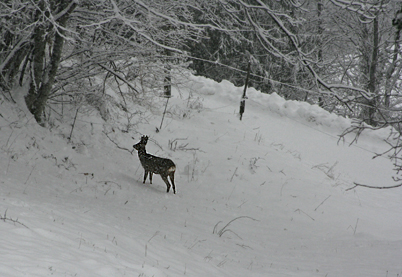Here is one of our regular visitors, the roe deer. This one is looking very intently at his two companions in the trees. We have had a stable population of three or four roe deer who include our land in their territory for over a decade. I decided to do a bit of nature study on my own and find out more about them. Until this morning I didn’t know their name in English.
The things that interested me most are the interactions between humans and the roe deer. Like many ubiquitous animals in populated areas, it has proved good at adapting to a humanised environment. Although it prefers to eat leaves, it will graze on young crops for example. In the absence of predators other than humans, its population is rather dense. The worst thing about this is that it encourages the spread of lyme disease, and other parasites and diseases that may affect the deer primarily. It seems that the deer can also limit the rejuvenation of forests. I must say that they don’t seem to be doing such a good job of that on our land. It’s also shocking to learn that in the absence of predators, roadkill is one of the most common causes of death. Striking an animal of this size is obviously also dangerous to the humans in the car.
Nature study has many facets, and this morning made me remember the social and political aspects as well. As societies and individuals, we all have to make decisions related to nature. In France, the possible reintroduction or natural return of large predators is one vector of social debate. In practical terms, right now, the main predators are human hunters, and the roe deer is one of the more common prey.
I knew very little about hunting around here, and decided it was time to find out more. It turns out the situation is rather complicated. Hunting varies a lot legally and culturally within Europe, and presumably even more elsewhere. Before the French revolution, hunting was largely a privilege of the aristocracy. At the revolution, the right to hunt was granted to everybody. It became one of those liberties that many people are emotionally attached to, rather like the right to carry guns in the US. Of course, there is no such thing as unattributed land in France, and the universal right to hunt essentially meant that anyone could hunt on anyone else’s property at any time.
In modern times there have been some changes. As a society ‘we’ use hunting to regulate the numbers of some species, and ban or severely limit hunting of other species. Quotas apply to most species, and there may be selection procedures in place. Although anyone can hunt, in most places it’s obligatory to join a local association. And, after several massive fights in the European courts, French landowners can now declare their own property as a no-hunt zone. Information like the opening and closing of the hunting season, and the various quotas should be easily accessible to the public, and actually, I found it on the internet without too much trouble – not so common in France!
In practical reality, this is the face of hunting we see as spectators: autumn around here sees the country roads lined with men hanging around on their 4-wheel drive jeeps and toting rifles, clearly enjoying the macho, male-bonding experience. Meanwhile, their dogs are busy getting lost all over the mountains, sometimes showing up on people’s doorsteps weeks later. And a few of the more timorous residents complain that they hardly dare take a walk during the season. I must admit I’ve never heard of a real accident. But it’s hard to believe, looking at this lot, that they actually have a clue what they’re doing. And some part of me would really, really like to see a few women try to join their little hunting club. It’s just so darned obvious that that would spoil their fun.
For me and for my daughter in the future, there are lots of decisions to make, choices that are emerging in our society from a combination of individual and group action. Other societies are dealing with different situations and consequences even around a similar topic like hunting. Nature study is also valuable for hopefully allowing our decisions to be made based on real knowledge, rather than on knee-jerk reactions.
